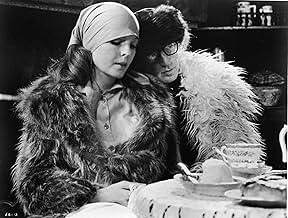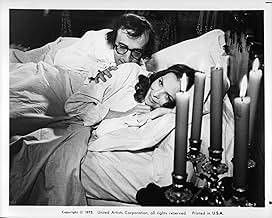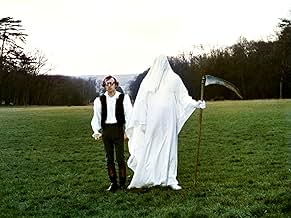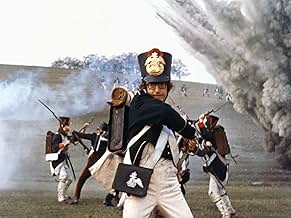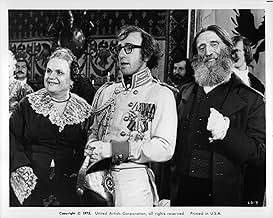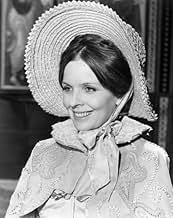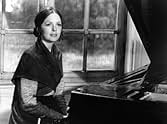IMDb RATING
7.6/10
43K
YOUR RATING
In czarist Russia, a neurotic soldier and his distant cousin formulate a plot to assassinate Napoleon.In czarist Russia, a neurotic soldier and his distant cousin formulate a plot to assassinate Napoleon.In czarist Russia, a neurotic soldier and his distant cousin formulate a plot to assassinate Napoleon.
- Awards
- 1 win & 1 nomination total
Féodor Atkine
- Mikhail
- (as Feodor Atkine)
Yves Barsacq
- Rimsky
- (as Yves Barsaco)
Gérard Buhr
- Servant
- (as Gerard Buhr)
Henri Czarniak
- Ivan
- (as Henry Czarniak)
- Director
- Writer
- All cast & crew
- Production, box office & more at IMDbPro
Featured reviews
This movie is considered to be a spoof of Russian Novels . It is set in czarist Russia, 1812 , a neurotic Boris Grushenko (Woody Allen) wishes to marry his distant cousin (Diane Keaton) . Although both of whom take two divergent ways in their lives, those paths cross once again . When Napoleon threatens to invade the Russian Empire, the coward soldier is forced to enlist to save his natal nation . Later on , Boris and his lover cousin formulate a scheme to assassinate Napoleon (James Tolkan) . At the end he is detained and the condemned man reviews his past life .
Amusing picture fable is plenty of the filmmaker's signature angst-ridden philosophical comedy . Hilarity slips into vulgarity rather too often in this usually in-and-out early Woody Allen comedy which embroils the little man in Russia invaded by Napoleon . Like a Russian soldier , the gags and funny sketches fire off in all directions . There is a lot of spoofs and even Bergman's ¨The seventh seal¨ and ¨Persona¨ and jokes for moviegoers . As the movie featured the Death character of The Grim Reaper , Allen is known to be inspired and influenced by Swedish filmmaker Ingmar Bergman who had featured the Grim Reaper in his film The seventh seal (1957) ; in the Bergman film the Grim Reaper wears black robes whereas in this film he wears a white gown . The picture is ironical about major Russian novels particularly the works of Leo Tolstoy and Fyodor Dostoevsky . In fact , the movie title is a play on words of such Russian novel titles as Leo Tolstoy's "War and Peace" and Fyodor Dostoevsky's "Crime and Punishment" . Nice acting by Woody Allen at his best , as a condemned man who reviews the follies of his life . His comic style paid homage to a number of classic comedians which included Bob Hope , Charles Chaplin and The Marx Brothers . Intermittently hilarious , pre-Annie Hall Allen fare , it is is one of eight cinema movie collaborations of Woody Allen and actress Diane Keaton, Allen co-starring in six of them and directing seven of them . These are the followings : Play It Again Sam , Sleeper , Interiors , Manhattan , Radio Days , and Manhattan Murder Mystery . It is fun enough to make wish there were more of it and you will have to keep your eyes peeled to spot notorious secondaries as Jessica Harper , Harold Gould , Olga Georges Picot , Féodor Atkine , Gérard Buhr , Howard Vernon and James Tolkan as Napoleón and his double and about ¨fifty-four supporting players" .
Witty as well as classical musical score contributes much . At the beginning the soundtrack was taken from Igor Stravinsky music , but , subsequently , Woody Allen took Sergei Prokofiev's lighthearted score that worked far better . The movie's big battle sequence features Sergei Prokofiev's cantata music from Sergei M. Eisenstein's epic Alexánder Nevsky (1938). Colorful as well as evocative cinematography by Ghislain Cloquet , being shot on location in Hungary and Paris , France . Lavish and stunningly produced by Charles H. Joffe , Allen's ordinary producer . This enjoyable motion picture was vigorously directed by Woody Allen , being his sixth film as director and here to ridicule Russian novels such as "The Idiot", "The Gambler", "War and Peace", "Anna Karenina", "Crime and Punishment", and "The Brothers Karamazov". Woody Allen has said that this movie was "my funniest picture to that time".
Amusing picture fable is plenty of the filmmaker's signature angst-ridden philosophical comedy . Hilarity slips into vulgarity rather too often in this usually in-and-out early Woody Allen comedy which embroils the little man in Russia invaded by Napoleon . Like a Russian soldier , the gags and funny sketches fire off in all directions . There is a lot of spoofs and even Bergman's ¨The seventh seal¨ and ¨Persona¨ and jokes for moviegoers . As the movie featured the Death character of The Grim Reaper , Allen is known to be inspired and influenced by Swedish filmmaker Ingmar Bergman who had featured the Grim Reaper in his film The seventh seal (1957) ; in the Bergman film the Grim Reaper wears black robes whereas in this film he wears a white gown . The picture is ironical about major Russian novels particularly the works of Leo Tolstoy and Fyodor Dostoevsky . In fact , the movie title is a play on words of such Russian novel titles as Leo Tolstoy's "War and Peace" and Fyodor Dostoevsky's "Crime and Punishment" . Nice acting by Woody Allen at his best , as a condemned man who reviews the follies of his life . His comic style paid homage to a number of classic comedians which included Bob Hope , Charles Chaplin and The Marx Brothers . Intermittently hilarious , pre-Annie Hall Allen fare , it is is one of eight cinema movie collaborations of Woody Allen and actress Diane Keaton, Allen co-starring in six of them and directing seven of them . These are the followings : Play It Again Sam , Sleeper , Interiors , Manhattan , Radio Days , and Manhattan Murder Mystery . It is fun enough to make wish there were more of it and you will have to keep your eyes peeled to spot notorious secondaries as Jessica Harper , Harold Gould , Olga Georges Picot , Féodor Atkine , Gérard Buhr , Howard Vernon and James Tolkan as Napoleón and his double and about ¨fifty-four supporting players" .
Witty as well as classical musical score contributes much . At the beginning the soundtrack was taken from Igor Stravinsky music , but , subsequently , Woody Allen took Sergei Prokofiev's lighthearted score that worked far better . The movie's big battle sequence features Sergei Prokofiev's cantata music from Sergei M. Eisenstein's epic Alexánder Nevsky (1938). Colorful as well as evocative cinematography by Ghislain Cloquet , being shot on location in Hungary and Paris , France . Lavish and stunningly produced by Charles H. Joffe , Allen's ordinary producer . This enjoyable motion picture was vigorously directed by Woody Allen , being his sixth film as director and here to ridicule Russian novels such as "The Idiot", "The Gambler", "War and Peace", "Anna Karenina", "Crime and Punishment", and "The Brothers Karamazov". Woody Allen has said that this movie was "my funniest picture to that time".
One of the funniest movies of all time. The War & Peace and Chekov slant gives it a great feel. Allen and Keaton are at their best, and funnier than Grace & Burns, Hepburn & Tracey, etc..
One of the better lines, "To love is to suffer. To avoid suffering one must not love, but then one suffers from not loving. Therefore, to love is to suffer, not to love is to suffer, to suffer is to suffer. To be happy is to love, to be happy then is to suffer but suffering makes one unhappy, therefore to be unhappy one must love or love to suffer or suffer from too much happiness. I hope you're getting this down."
This classic comedy is very rarely known, and worth watching it over and over.
One of the better lines, "To love is to suffer. To avoid suffering one must not love, but then one suffers from not loving. Therefore, to love is to suffer, not to love is to suffer, to suffer is to suffer. To be happy is to love, to be happy then is to suffer but suffering makes one unhappy, therefore to be unhappy one must love or love to suffer or suffer from too much happiness. I hope you're getting this down."
This classic comedy is very rarely known, and worth watching it over and over.
For me Love & Death and Sleeper were Allen's zenith for slapstick, one-liner comic-gag comedy. After the relatively immature but amusing Bananas & Everything You always Wanted To Know About Sex, Allen goes up a notch in the intellectual comedy stakes to produce this fine send-up of Russian culture & historical caricature.
Even though some of the one-liner jokes don't always come off it doesn't matter because you never really get chance to think too much about how droll it is because Allen has another half dozen gags waiting in the wings.
But I've often found that Allen works best when he has a foil for his anarchic humour: and thank the Lord he managed to find the wonderful talent of Ms Keaton. She may not be his intellectual equal but she can run him to ground in nearly everything else. She has a kind of naive charm in this movie, always daydreaming, never really listening to Allen's mutterings & jabberings. And with this naivity brings warmth, humility and a general sense of well being.
At the same time Allen can release all his pentup emotions, fears, neo-neurosis to Keaton knowing full well that she wouldn't have a single notion as to what he was on about.
And thats what makes this partnership so durable whether it be here in Love & Death, or Sleeper, Annie Hall or Manhattan Murder Mystery. The scripts may vary but they're held together by the spontaneity of the two stars.
It should be said also that Love & Death breaks new ground for Allen, because even though he still relies on the childish humour of his earlier films, it is also quite clear that he is more forthcoming with his angst against a problematic world. His philosophic nuances dominate a lot of the film, which he will put to more practical use in his latter films like Annie Hall & Manhattan. But here he gets the mix between jokes & existentualism just right.
Love & Death is quite literally a laugh a minute. Whatever people may say about his recent personal problems it cannot be denied that this guy is a pure talent and should be cherished for what he is - a man that makes the world a happier place, if only for a few hours!
****/*****
Even though some of the one-liner jokes don't always come off it doesn't matter because you never really get chance to think too much about how droll it is because Allen has another half dozen gags waiting in the wings.
But I've often found that Allen works best when he has a foil for his anarchic humour: and thank the Lord he managed to find the wonderful talent of Ms Keaton. She may not be his intellectual equal but she can run him to ground in nearly everything else. She has a kind of naive charm in this movie, always daydreaming, never really listening to Allen's mutterings & jabberings. And with this naivity brings warmth, humility and a general sense of well being.
At the same time Allen can release all his pentup emotions, fears, neo-neurosis to Keaton knowing full well that she wouldn't have a single notion as to what he was on about.
And thats what makes this partnership so durable whether it be here in Love & Death, or Sleeper, Annie Hall or Manhattan Murder Mystery. The scripts may vary but they're held together by the spontaneity of the two stars.
It should be said also that Love & Death breaks new ground for Allen, because even though he still relies on the childish humour of his earlier films, it is also quite clear that he is more forthcoming with his angst against a problematic world. His philosophic nuances dominate a lot of the film, which he will put to more practical use in his latter films like Annie Hall & Manhattan. But here he gets the mix between jokes & existentualism just right.
Love & Death is quite literally a laugh a minute. Whatever people may say about his recent personal problems it cannot be denied that this guy is a pure talent and should be cherished for what he is - a man that makes the world a happier place, if only for a few hours!
****/*****
As a huge Woody Allen fan, I was delighted and surprised by this film. I have scarcely heard anyone mention it, but for my money it is the single most comically dense of all of Woody's films. There are so many truly impressive/hilarious/memorable one-liners that I'm amazed people don't quote this movie left and right. The setting, costumes, accents all add to the hilarity of the film--truly reminiscent of a Marx Brothers romp. Really outstanding among his pre-Annie Hall films. Only rivaled by Bananas in my opinion for simple laugh value.
Unlike any other of his films, this deals with his "deep" questions of death/metaphysics in an unflaggingly light and comical fashion. For instance:
Sonja: But judgment of any system or a priori relation of phenomena exists in any rational or metaphysical or at least epistemological contradiction to an abstracted empirical concept such as being or to be or to occur in the thing itself or of the thing itself.
Boris: Yeah, I've said that many times.
Not Woody's "best" film (see Annie Hall, Manhattan, Crimes and Misdemeanors), but perhaps his most laugh-filled. Satisfying throughout. I give it a 9/10.
Unlike any other of his films, this deals with his "deep" questions of death/metaphysics in an unflaggingly light and comical fashion. For instance:
Sonja: But judgment of any system or a priori relation of phenomena exists in any rational or metaphysical or at least epistemological contradiction to an abstracted empirical concept such as being or to be or to occur in the thing itself or of the thing itself.
Boris: Yeah, I've said that many times.
Not Woody's "best" film (see Annie Hall, Manhattan, Crimes and Misdemeanors), but perhaps his most laugh-filled. Satisfying throughout. I give it a 9/10.
"Love and Death" is one of Woody Allen's "early, funny ones," before he made darker and more serious films, such as "Stardust Memories" (1980) where Allen's line about his own oeuvre originates. He made "Annie Hall" (1977) next, and his career would never be the same. On the other hand, being a parody of 19th-century Russian literature, "Love and Death" is full of esoteric references. The major throughline is Leo Tolstoy's "War and Peace," but there's enough Fyodor Dostoevsky here for me to have reviewed it as part of my mission to see a bunch of "Crime and Punishment" pictures after reading the book. Moreover, Allen would go on to make three movies (thus far) more heavily and singularly inspired by this particular novel: "Crimes and Misdemeanors" (1989), "Match Point" (2005) and "Irrational Man" (2015). It's interesting to compare how he went from "Love and Death," which is non-stop comedic frivolity complete with a gag being performed at every moment to "Match Point," where there are no jokes.
Indeed, "Love and Death" is not only an homage to literature, but also to early screen comics. There's even a scene where the sound goes out for some silent slapstick, and the fourth-wall-breaking absurdity of the whole thing seems to be especially indebted to the Marx Brothers. As for the Russian connection, though, there are extended mock-philosophical discussions, angst over the existence of God, somber soliloquies, multiple suitors and lovers for everyone, subplots upon subplots and periphery character galore, a lot to do with class and nationality, and... wheat, I guess. (I love that in a blog post from Alistair Ian Blyth that one of my favorite films of the 1910s, "After Death" (1915), which is based on the prose of Ivan Turgenev, is brought up to help explain the supposed importance of wheat in Russian literature.)
Some of the Dostoevsky references are obvious. Allen has a conversation in a jail cell that entirely exists of characters and titles from his stories, including some gossip about a local named "Raskolnikov" who murdered two women. Additionally, Diane Keaton's character is named "Sonja," the hooker with a heart of gold who instigates Raskolnikov's regeneration in the book. "Love and Death" offers the best character summary of Sonja, though, from her own lips: "I'm half saint, half wh-re" (IMDb censorship, you know). And, naturally, Allen plays the atheistic foil to her pious promise land. Best of all, however, is how the connection with Napoleon between "War and Peace" and "Crime and Punishment" is exploited in this film with two other words surrounding the conjunction. Sonja decides that she and Allen's Boris should kill Napoleon for the benefit of humanity, which is akin to the rationale of Raskolnikov for murdering the pawnbroker. Ironically, Napoleon was also his role model for this "extraordinary" act. Boris mixes up the roles further by comparing himself to an insect, which is what Raskolnikov said of the pawnbroker, and claiming Napoleon as a great man. Looking at the parodic adaptation this way gives one as much whiplash as Allen and Keaton's philosophical repartee. To top it off, there are two Napoleons.
There are some allusions to non-comedic films here, too. The ones to "Battleship Potemkin" (1925) and "Persona" (1966) seemed most conspicuous to me. Although "Love and Death" is a lightweight affair, and the jokes are hit and miss, it rewards those who've seen and read what it parodies. And, admittedly, Russian novels such as "Crime and Punishment" were just asking for this sort of loving pillory.
Indeed, "Love and Death" is not only an homage to literature, but also to early screen comics. There's even a scene where the sound goes out for some silent slapstick, and the fourth-wall-breaking absurdity of the whole thing seems to be especially indebted to the Marx Brothers. As for the Russian connection, though, there are extended mock-philosophical discussions, angst over the existence of God, somber soliloquies, multiple suitors and lovers for everyone, subplots upon subplots and periphery character galore, a lot to do with class and nationality, and... wheat, I guess. (I love that in a blog post from Alistair Ian Blyth that one of my favorite films of the 1910s, "After Death" (1915), which is based on the prose of Ivan Turgenev, is brought up to help explain the supposed importance of wheat in Russian literature.)
Some of the Dostoevsky references are obvious. Allen has a conversation in a jail cell that entirely exists of characters and titles from his stories, including some gossip about a local named "Raskolnikov" who murdered two women. Additionally, Diane Keaton's character is named "Sonja," the hooker with a heart of gold who instigates Raskolnikov's regeneration in the book. "Love and Death" offers the best character summary of Sonja, though, from her own lips: "I'm half saint, half wh-re" (IMDb censorship, you know). And, naturally, Allen plays the atheistic foil to her pious promise land. Best of all, however, is how the connection with Napoleon between "War and Peace" and "Crime and Punishment" is exploited in this film with two other words surrounding the conjunction. Sonja decides that she and Allen's Boris should kill Napoleon for the benefit of humanity, which is akin to the rationale of Raskolnikov for murdering the pawnbroker. Ironically, Napoleon was also his role model for this "extraordinary" act. Boris mixes up the roles further by comparing himself to an insect, which is what Raskolnikov said of the pawnbroker, and claiming Napoleon as a great man. Looking at the parodic adaptation this way gives one as much whiplash as Allen and Keaton's philosophical repartee. To top it off, there are two Napoleons.
There are some allusions to non-comedic films here, too. The ones to "Battleship Potemkin" (1925) and "Persona" (1966) seemed most conspicuous to me. Although "Love and Death" is a lightweight affair, and the jokes are hit and miss, it rewards those who've seen and read what it parodies. And, admittedly, Russian novels such as "Crime and Punishment" were just asking for this sort of loving pillory.
Did you know
- TriviaIn an interview with 'Esquire' magazine, Woody Allen once said of the making of this movie: "When good weather was needed, it rained. When rain was needed, it was sunny. The cameraman was Belgian, his crew French. The underlings were Hungarian, the extras were Russian. I speak only English - and not really that well. Each shot was chaos. By the time my directions were translated, what should have been a battle scene ended up as a dance marathon. In scenes where Keaton and I were supposed to stroll as lovers, Budapest suffered its worst weather in twenty-five years".
- GoofsThe young Boris has blue eyes, but the adult Boris has brown eyes.
- Quotes
Sonja: To love is to suffer. To avoid suffering one must not love. But then one suffers from not loving. Therefore, to love is to suffer; not to love is to suffer; to suffer is to suffer. To be happy is to love. To be happy, then, is to suffer, but suffering makes one unhappy. Therefore, to be unhappy, one must love or love to suffer or suffer from too much happiness. I hope you're getting this down.
- Crazy creditsRussian composer Sergei Prokofiev is listed in the credits as "S. Prokofiev," just the way he would have been listed in the credits of a Russian film.
- Alternate versionsThe MGM DVD release deletes the pre-title Prokofiev overture.
- ConnectionsFeatured in V.I.P.-Schaukel: Episode #7.3 (1977)
Details
- Release date
- Country of origin
- Official site
- Language
- Also known as
- Love and Death
- Filming locations
- Production company
- See more company credits at IMDbPro
Box office
- Budget
- $3,000,000 (estimated)
- Gross US & Canada
- $20,123,742
- Gross worldwide
- $20,123,742
Contribute to this page
Suggest an edit or add missing content



